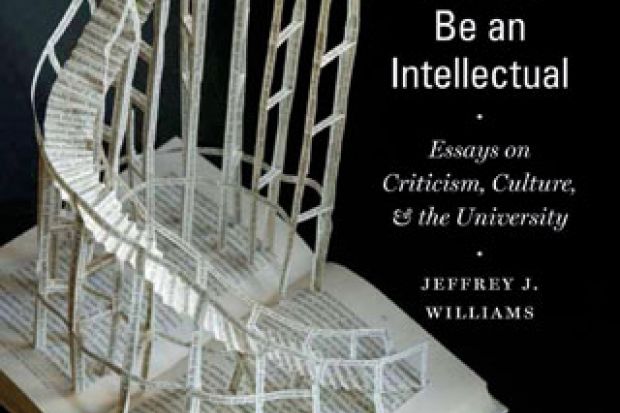It is to put quite a lot of money on yourself to choose a title such as this, and it must be said that Jeffrey Williams loses his bet. He is of course not so immodest as to present himself as the intellectual in question, but he figures quite large in these pages certainly as the equal of Richard Rorty, Stephen Greenblatt or Michael Walzer, and meanwhile commending to us aspects of his career as editor of the minnesota review, as interviewer of these three men and several other stars of dissidence, including the heroine of queer theory, Judith Halberstam, and on this side of the water, Stefan Collini and Terry Eagleton.
The trouble with this book is that it isn’t a book at all. Williams has bundled together a dossier of his pretty brief articles on culture and Theory (with a capital T), on the accelerating corporatisation of universities (far and away the most telling section of the book) and lumps in with these a dozen or so decidedly thin and amiably approving interviews with candidates for the position of public intellectual, all this without an index but with textual repetitions that he should have edited out.
The interviews, unhappily, lack presence and body. It is hard in retrospect to distinguish between them, for Williams – always, it would seem, writing fast and short of time – quotes none of his own questions, so leaving the reader quite unable to test the work of each as reported for mere usefulness, let alone readability. When he lights upon a topic that sounds intuitively appetising – a good read on a train journey, say – as with two short articles on the university in film and fiction, he provides hardly more than a list, and omits A Beautiful Mind, which was at least a serious attempt to dramatise the force of the academic vocation, and he obviously knew nothing of John Williams’ Stoner, now welcomed by everyone to the canon of American literature as realising the noblest embodiment of scholarly courage and integrity imaginable.
Far and away the best parts of the book are the articles dealing with the steady corruption of universities by corporate forces, neoliberal economics and the ideology of managerialism. Williams is, for example, both sound and rousing on the subject – still not confronted by anybody authoritative in this country – of student debt. Here in the UK, the government is insolently indifferent to the upward rush of student debt while strenuously sanctimonious about the infernal deficit (itself far from unmanageably large, as any historian can tell us).
Williams develops this malediction, as well he might, by describing the conversion of junior academics into paupers and wage-slaves and – never slow to self-promotion, but, hell, he’s done the work, promoted the activism, earned the praise – reports his very own founding of Academic Opportunities Unlimited, intended to campaign vigorously on behalf of younger applicants for university jobs and to press their elders into well-pensioned retirement.
That is the book that, with his impressively wandering career – professor of literature, editor-journalist, prison officer no less – Williams was well equipped to make into another but still much-needed study. Such a work – the Gulliver’s Travels or Animal Farm of our day – would describe and theorise the steady, ruinous dereliction by our rulers of the one social institution still assigned to think and teach hard about how to live well, to honour nature, and to ensure that the future will make possible lives that are sufficiently just, lovely and of good report.
How to be an Intellectual: Essays on Criticism, Culture, and the University
By Jeffrey J. Williams
Fordham University Press, 232pp, £66.00 and £18.99
ISBN 9780823263806 and 3813
Published 15 September 2014
Register to continue
Why register?
- Registration is free and only takes a moment
- Once registered, you can read 3 articles a month
- Sign up for our newsletter
Subscribe
Or subscribe for unlimited access to:
- Unlimited access to news, views, insights & reviews
- Digital editions
- Digital access to THE’s university and college rankings analysis
Already registered or a current subscriber? Login





